Turkey’s painful diplomacy in the anti-terror fight
For the last two days, Turkey has been talking about the heroic move by Fethi Sekin, a police officer who prevented a disaster from happening in the western city of İzmir on Jan. 5.
When a group of heavily armed militants from the outlawed Kurdistan Workers’ Party (PKK), as announced by Justice Minister Bekir Bozdağ, attempted to attack the main courthouse of Turkey’s third biggest city at a time when the working day was over and judges and prosecutors were about to leave the building, this police officer realized that something was wrong with the car approaching the compound. He asked the car to stop by the security barricades. With their plans spoiled, two militants with AK-47 automatic rifles came out of the car and start shooting. Sekin fired back with his pistol and shot one of them, but was shot and killed by the other. A second car was detonated nearby, supposedly a part of the original plan. An unrevealed number of militants managed to escape, but two of them were killed. Musa Can, a clerk of Alevi origin working in the courthouse, was also killed by the terrorists.
If they had not been stopped by this 43-year-old policemen, also of Kurdish origin, the attack might have ended up with another terrorism disaster which Turkey has been facing one after another nowadays. They were carrying seven anti-tank rockets, powerful enough to penetrate the walls, and eight hand grenades, in addition to backup cartridges for the Kalashnikovs and automatic pistols as well, probably so as to take the maximum number of lives.
The attack came after a major attack by the Islamic State of Iraq and Levant (ISIL), or DAESH in Arabic, in Istanbul just four days previously.
In 2016, Turkey was the country that suffered the most from ISIL terrorist attacks in the world, excluding Syria, where they control parts of the country, while the PKK also took hundreds of lives in suicide attacks. 2017, however, has started with attacks of those two organizations as if they have threatened more.
While addressing crowds on Jan. 6 in Şanlıurfa, a province on the Syrian border, Turkish President Tayyip Erdoğan said those threats would not deter Turkey from its fight against terrorist organizations. “They are acting in coordination, but they will not be able to get away with this,” he vowed.
A day before, Erdoğan criticized one of Turkey’s NATO allies, the United States, without naming it, accusing it of supporting the PKK’s Syria branch, the Democratic Union Party (PYD), as the ground unit against Turkey, despite assistance provided by Ankara.
The tension with the U.S. over the PKK (which is also designated as a terrorist group by Washington) is the biggest pain in Turkey’s security diplomacy nowadays. Defense Minister Fikri Işık repeated on Jan. 6 in bolder words that, if it works against Turkish interests, Turkey might close its strategic İncirlik base to U.S. flights, prompting the Pentagon to say it “hoped” such things would not occur.
İbrahim Kalın, Erdoğan’s spokesman, said on Jan. 5 that Turkey would suspend that decision until the first contact with the new U.S. president, Donald Trump, who will take office from Barack Obama on Jan. 20.
But Turkey’s painful diplomacy in its fight against terror is not limited to the U.S. or with the European Union.
Prime Minister Binali Yıldırım gives the utmost importance to his visit to Baghdad. He said he aimed to normalize relations with Iraq “after Israel and Russia.”
Turkey’s relations with Israel and Russia were resumed in two separate moves in June 2016, some 20 days before the failed July 15 coup, in the first weeks of Yıldırım’s assumption of office from former PM Ahmet Davutoğlu, as a result of months of diplomacy.
In retrospect, it can be seen that Turkey’s gaining an advantage in Syria occurred after the improvement of relations with Russia; President Vladimir Putin and Erdoğan wouldn’t let ties be spoiled even after the assassination of Russian Ambassador to Ankara Andrey Karlov on Dec. 19, 2016.
Iraq is important for two main reasons. The first is the PKK; its headquarters have been in the Kandil mountains of Iraq for 30 years. After that statement by Yıldırım, Haidar al-Abadi of Iraq said he did not approve of PKK attacks from Iraq on Turkey – that is the first such statement by Baghdad, ever.
The second reason is the al-Abadi government’s pro-Iran stance.
Iran is expected to be a guarantor state besides Russia and Turkey in the Astana talks scheduled for Jan. 23 to endorse the cease-fire in Syria that was facilitated by a Turco-Russian initiative on Dec. 29, 2016.
It is not possible to consider the rise of terrorism in Turkey separately from those difficult steps in countering terrorism in the field of diplomacy.











